Civilians are Not a Target: World Humanitarian Day 2017
18/8/17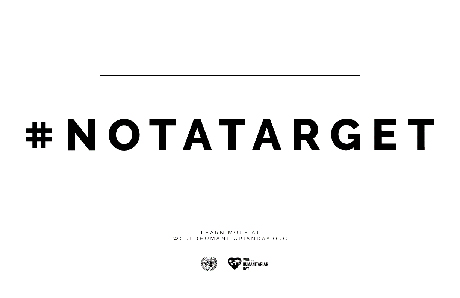
Learn more at the World Humanitarian Day website
In situations of armed conflict, civilians face terrible and terrifying consequences. Many cities, towns and villages worldwide have become battlefields, forcing people to flee their homes. Many men, women and children have suffered the indignity of violent attacks and sexual violence. Humanitarian workers trying to provide lifesaving assistance have themselves become targets. World Humanitarian Day is a day that encourages support for people in need of humanitarian assistance and the humanitarian workers who risk their lives to provide lifesaving aid. In 2017, World Humanitarian Day calls on people across the world to ‘stand together’ and share the message that civilians are not a target.
Ireland’s humanitarian assistance programme, managed by Irish Aid, works in partnership with UN agencies, Red Cross, NGOs in conflict situations across the world. These partners, supported by Irish Aid, are helping protect civilians from the negative consequences of violent conflict and war.
‘Our City is not a battlefield’
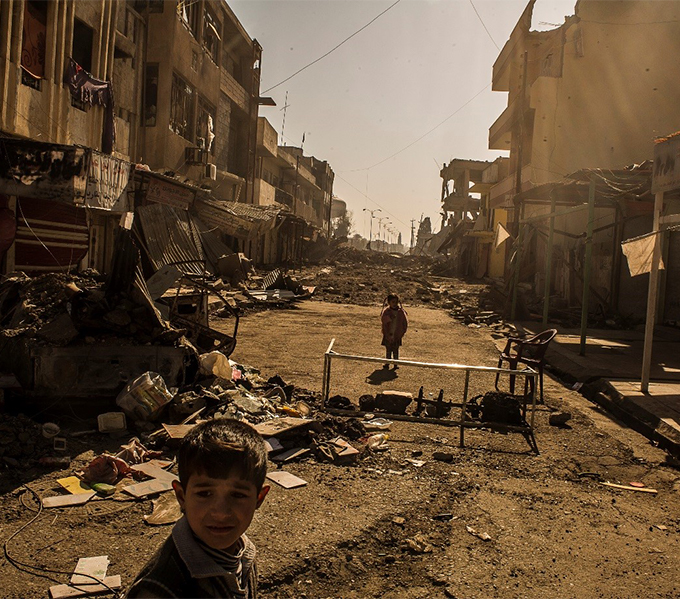
Children playing in the streets. Many of the houses and civilian infrastructure has been destroyed during the offensives. Photograph credit: ICRC 2017
After nearly nine months of bitter fighting to displace the extremist group ISIS, the city of Mosul in Iraq was reclaimed by Iraqi forces in July 2017. While the worst of the fighting is over, Iraqi civilians continue to face life-threatening risks, for example from unexploded mines scattered across the city. Hundreds of thousands of people were forced to flee their homes as a result of the fighting. Houses, schools and hospitals have been completely destroyed. The situation in Mosul is very much a tale of two cities. East Mosul saw comparatively less damage, allowing civilians to return home quickly and for markets and schools to reopen, however the damage in the West is widespread, some 200,000 people have been left homeless, insecurity is still high and people continue to flee. Humanitarian actors will need to continue to focus on the needs of these extremely vulnerable people, who have been subject to, and witness of, unthinkable human rights abuses under the ISIS siege. The UN managed Iraq Humanitarian Fund gives funding to NGOs and UN agencies on the ground to respond to urgent humanitarian needs. In 2017, this fund is supporting a national NGO in Iraq to provide urgent remedial classes, psychosocial support and mine risk education for conflict affected children and school rehabilitation in Mosul. Ireland has provided €2 million to the Iraq Humanitarian Fund this year and a total of €5.5 million since 2015.
‘Our Aid is not a threat’
Health Care in Danger is an initiative of the International Red Cross and Red Crescent Movement to make access to, and delivery of, health care safer in armed conflict or other emergencies. This initiative calls for the respect and protection of patients, health-care workers, facilities and vehicles and the implementation of a series of recommendations and practical measures to safeguard health-care services and their humanitarian mission.
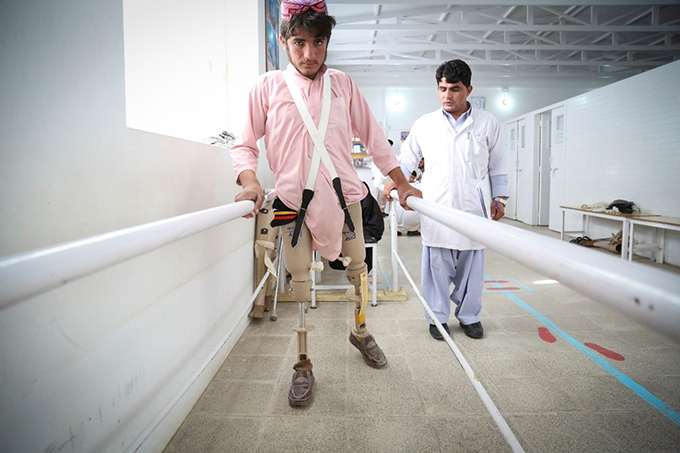
Lashkar Gah, ICRC orthopedic centre. Abdul Latif, a patient. Photograph credit: ICRC 2017
The International Committee of the Red Cross (ICRC) work in Afghanistan focuses on assisting people affected by the conflict and ongoing violence there, including attacks on health facilities and health workers, by providing basic aid and medical care, and working in cooperation with the Afghan Red Crescent Society (ARCS). The ICRC transports war-wounded patients to medical centres and provides first aid and stabilization material to first aid workers and health staff in direct contact with weapon-wounded people. The ICRC also supports hospitals in Afghanistan, including through the deployment of mobile surgical teams and specialists to train and build capacity of health partners. As well as providing support to clinics, the ICRC donates drugs and medical equipment. The ICRC also assists patients with limb-fitting and physical rehabilitation services and makes prostheses and orthoses. In 2017, Ireland has provided €12.5 million to the ICRC, including €9.5 million in core funding, €1.5 million to support the ICRC response in the Lake Chad region and €1.5 million for the ICRC response in Syria. Our total funding to the ICRC since 2006 is over €100 million.
‘My dignity is not your revenge’
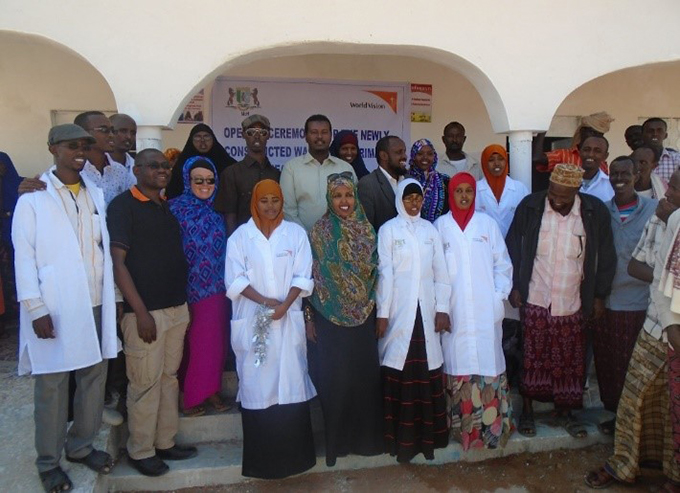
Health staff at the opening of Celmadobe Primary Health Unit in Eyl, Puntland, Somalia. Photograph Credit: World Vision 2016
During conflict the vulnerability of women and girls is particularly exacerbated, with heightened risk of experiencing some form of abuse, including Gender Based Violence (GBV). The region of Puntland in Somalia is very fragile, faced with armed violence, poor governance, poverty and harsh climatic conditions. In 2015 and 2016, World Vision Ireland alongside its implementing partner, World Vision Somalia, championed gender mainstreaming in a year-long humanitarian project funded by Irish Aid, aiming to improve health care in Eyl, Puntland, Somalia. World Vision aimed to prevent GBV by carrying out community sessions on GBV, to raise awareness on its prevalence, root causes, consequences and prevention, in addition to factors increasing the vulnerability of women and girls. Preventing gender based violence in emergencies is, in itself, a lifesaving action. Through its NGO partners, Ireland is working to ensure the protection of women and girls in all humanitarian action.
‘My Innocence is not your weapon’
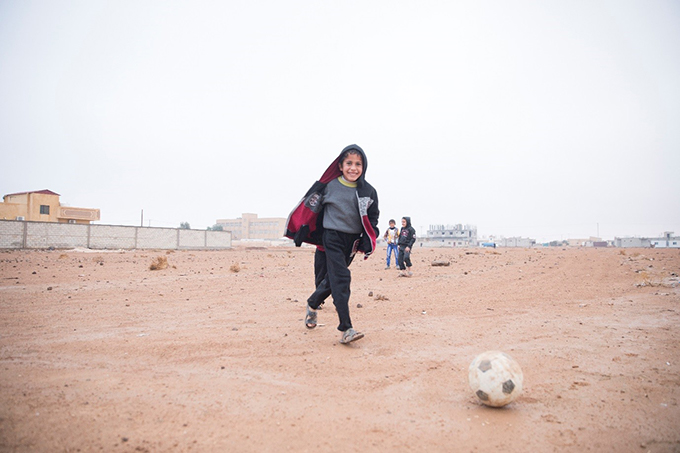
Amman,Jordan Zaatari Refugee camp. Photograph credit: ICRC 2016
An entire generation of children and youth have been deeply affected by violence and displacement as a result of the war in Syria, now in its seventh year. For many of them, living through war is the only life that they have experienced. They are on the verge of becoming a lost generation. UNICEF’s No Lost Generation (NLG) Initiative works to protect children, adolescent and youths from the threat of poverty through providing educational and protection services within Syria and the refugee hosting countries of Turkey, Jordan, Lebanon, Iraq and Egypt. Since the beginning of this year, over one hundred thousand Syrian refugee children in Jordan – more than half of whom are girls – have been able to continue their education through schools set up in refugee camps and host communities under the No Lost Generation Initiative. Summer schools are now underway, helping children to progress in time for the new school year. Girls, who often face greater challenges in accessing education, are being supported through special ‘drop out’ and ‘catch up’ programmes. Ireland has supported the No Lost Generation Initiative as part of our response to the Syria crisis, providing over €3.4 million since 2015.

